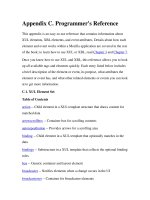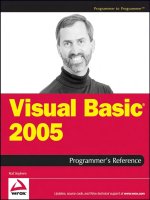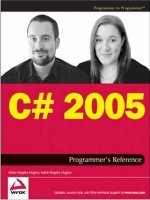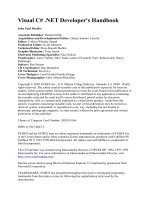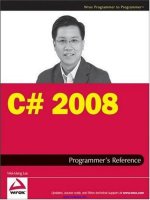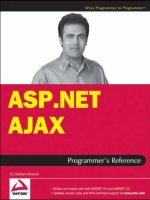C# 2005 Programmer’s Reference potx
Bạn đang xem bản rút gọn của tài liệu. Xem và tải ngay bản đầy đủ của tài liệu tại đây (4.21 MB, 419 trang )
C# 2005
Programmer’s Reference
Adrian Kingsley-Hughes
Kathie Kingsley-Hughes
01_046414 ffirs.qxp 10/4/06 11:21 AM Page iii
01_046414 ffirs.qxp 10/4/06 11:21 AM Page ii
C# 2005
Programmer’s Reference
01_046414 ffirs.qxp 10/4/06 11:21 AM Page i
01_046414 ffirs.qxp 10/4/06 11:21 AM Page ii
C# 2005
Programmer’s Reference
Adrian Kingsley-Hughes
Kathie Kingsley-Hughes
01_046414 ffirs.qxp 10/4/06 11:21 AM Page iii
C# 2005 Programmer’s Reference
Published by
Wiley Publishing, Inc.
10475 Crosspoint Boulevard
Indianapolis, IN 46256
www.wiley.com
Copyright © 2007 by Wiley Publishing, Inc., Indianapolis, Indiana
Published simultaneously in Canada
ISBN-13: 978-0-470-04641-8
ISBN-10: 0-470-04641-4
Manufactured in the United States of America
10 9 8 7 6 5 4 3 2 1
1B/RZ/RQ/QW/IN
Library of Congress Cataloging-in-Publication Data
Kingsley-Hughes, Adrian.
C# 2005 programmer’s reference / Adrian Kingsley-Hughes, Kathie Kingsley-Hughes.
p. cm.
ISBN-13: 978-0-470-04641-8 (paper/website)
ISBN-10: 0-470-04641-4 (paper/website)
1. C# (Computer program language) I. Kingsley-Hughes, Kathie. II. Title.
QA76.73.C154K575 2006
005.13’3 dc22
2006030327
No part of this publication may be reproduced, stored in a retrieval system or transmitted in any form or by any means,
electronic, mechanical, photocopying, recording, scanning or otherwise, except as permitted under Sections 107 or 108
of the 1976 United States Copyright Act, without either the prior written permission of the Publisher, or authorization
through payment of the appropriate per-copy fee to the Copyright Clearance Center, 222 Rosewood Drive, Danvers,
MA 01923, (978) 750-8400, fax (978) 646-8600. Requests to the Publisher for permission should be addressed to the Legal
Department, Wiley Publishing, Inc., 10475 Crosspoint Blvd., Indianapolis, IN 46256, (317) 572-3447, fax (317) 572-4355,
or online at />LIMIT OF LIABILITY/DISCLAIMER OF WARRANTY: THE PUBLISHER AND THE AUTHOR MAKE NO REPRE-
SENTATIONS OR WARRANTIES WITH RESPECT TO THE ACCURACY OR COMPLETENESS OF THE CONTENTS
OF THIS WORK AND SPECIFICALLY DISCLAIM ALL WARRANTIES, INCLUDING WITHOUT LIMITATION WAR-
RANTIES OF FITNESS FOR A PARTICULAR PURPOSE. NO WARRANTY MAY BE CREATED OR EXTENDED BY
SALES OR PROMOTIONAL MATERIALS. THE ADVICE AND STRATEGIES CONTAINED HEREIN MAY NOT BE
SUITABLE FOR EVERY SITUATION. THIS WORK IS SOLD WITH THE UNDERSTANDING THAT THE PUBLISHER
IS NOT ENGAGED IN RENDERING LEGAL, ACCOUNTING, OR OTHER PROFESSIONAL SERVICES. IF PROFES-
SIONAL ASSISTANCE IS REQUIRED, THE SERVICES OF A COMPETENT PROFESSIONAL PERSON SHOULD BE
SOUGHT. NEITHER THE PUBLISHER NOR THE AUTHOR SHALL BE LIABLE FOR DAMAGES ARISING HERE-
FROM. THE FACT THAT AN ORGANIZATION OR WEBSITE IS REFERRED TO IN THIS WORK AS A CITATION
AND/OR A POTENTIAL SOURCE OF FURTHER INFORMATION DOES NOT MEAN THAT THE AUTHOR OR
THE PUBLISHER ENDORSES THE INFORMATION THE ORGANIZATION OR WEBSITE MAY PROVIDE OR REC-
OMMENDATIONS IT MAY MAKE. FURTHER, READERS SHOULD BE AWARE THAT INTERNET WEBSITES
LISTED IN THIS WORK MAY HAVE CHANGED OR DISAPPEARED BETWEEN WHEN THIS WORK WAS WRIT-
TEN AND WHEN IT IS READ.
For general information on our other products and services please contact our Customer Care Department within the
United States at (800) 762-2974, outside the United States at (317) 572-3993 or fax (317) 572-4002.
Trademarks: Wiley, the Wiley logo, Wrox, the Wrox logo, Programmer to Programmer, and related trade dress are
trademarks or registered trademarks of John Wiley & Sons, Inc. and/or its affiliates, in the United States and other
countries, and may not be used without written permission. All other trademarks are the property of their respective
owners. Wiley Publishing, Inc., is not associated with any product or vendor mentioned in this book.
Wiley also publishes its books in a variety of electronic formats. Some content that appears in print may not be avail-
able in electronic books.
01_046414 ffirs.qxp 10/13/06 1:22 PM Page iv
For our kids; you really are the best!
01_046414 ffirs.qxp 10/4/06 11:21 AM Page v
About the Authors
Adrian and Kathie Kingsley-Hughes have written several successful technical/PC books on a variety of
computer and IT-related topics. They have also developed numerous successful training manuals and
Internet-based courses for nearly a decade.
Along with their day-to-day work, they currently teach online courses for several training providers,
and Adrian also teaches several highly successful online courses for Barnes and Noble University. They
have produced courses and materials that have been used extensively by many Fortune 500 companies
and leading universities.
Put simply, they’re both geeks!
01_046414 ffirs.qxp 10/4/06 11:21 AM Page vi
Credits
Acquisitions Editor
Katie Mohr
Senior Development Editor
Tom Dinse
Technical Editor
Andrew Moore
Production Editor
William A. Barton
Copy Editor
C.M. Jones
Editorial Manager
Mary Beth Wakefield
Production Manager
Tim Tate
Vice President and Executive Group Publisher
Richard Swadley
Vice President and Executive Publisher
Joseph B. Wikert
Graphics and Production Specialists
Carrie A. Foster
Heather Ryan
Alicia B. South
Quality Control Technician
Dwight Ramsey
Project Coordinator
Ryan Steffen
Media Development Specialists
Angela Denny
Kit Malone
Travis Silvers
Proofreading and Indexing
Techbooks
01_046414 ffirs.qxp 10/4/06 11:21 AM Page vii
01_046414 ffirs.qxp 10/4/06 11:21 AM Page viii
Acknowledgments
A book like this is never the work of just the authors; it comes about as a result of a lot of hard work and
the collaboration of dozens of people. The names on the cover represent just a small part of the equation
(as authors, we feel that we are standing on the shoulders of a great many people who don’t get their
names on the cover).
Knowing where to start thanking people can be difficult, but with this book it’s not. First and foremost,
our thanks and appreciation go out to Katie Mohr, our tireless, hard-working acquisitions editor at
Wiley, who first approached us with the opportunity to write this book. The amount of work and effort
you put into this book, Katie, was just amazing, and the final product is infinitely better thanks to your
input.
Our thanks also goes to our excellent development editor, Tom Dinse, who suggested a number of
improvements and changes. Your feedback was very valuable, and it was a real pleasure to work
with you!
There are a whole bunch of folks over at Wiley whom we haven’t mentioned—people who have worked
anonymously in the background, laying out the book, indexing, proofreading, advertising, signing
checks—we appreciate your valuable contribution to this title.
No electrons were harmed in the making of this book, but some did have to work extra hard in order to
meet deadlines.
01_046414 ffirs.qxp 10/4/06 11:21 AM Page ix
01_046414 ffirs.qxp 10/4/06 11:21 AM Page x
Contents
Acknowledgments ix
Introduction xxiii
How This Book Is Different xxiii
Who This Book Is For xxiii
How This Book Is Structured xxiv
How to Tackle the Chapters xxv
A Few Tips . . . xxv
Conventions xxvi
Source Code xxvi
Errata xxvi
p2p.wrox.com xxvii
Chapter 1: What is C#? 1
The Name 1
C# Overview 1
History 2
C# and CLR 2
Diversions Into .NET 2
Standards 3
Other Implementations 3
Sample C# Code 3
The Benefits of Learning C# 5
Summary 6
Chapter 2: Getting Started with C# 7
Getting Into C# is Cheaper Than You Think! 7
The Cheap End of the Spectrum 7
How to Leverage Free C# Tools 10
One Cheap Utility That Makes Life Easier! 13
Alternative Text Editors and C# Tools 15
Enterprise Tools - Visual Studio and Visual C# 15
Summary 16
02_046414 ftoc.qxp 10/4/06 11:21 AM Page xi
xii
Contents
Chapter 3: Overview of C# 17
C# 17
C# Basics 17
Examining the C# Source Code 18
Types 19
Value Types 19
Reference Types 19
Predefined Types 19
Overloading 22
Conversions 22
Array Types 22
Variables and Parameters 23
Expressions 24
Statements 26
Classes 27
Constants 28
Fields 28
Methods 28
Properties 28
Events 29
Operators 29
Indexers 29
Instance Constructors 29
Finalizers 29
Static Constructors 30
Inheritance 30
Static Classes 30
Structs 30
Interfaces 30
Delegates 31
Enums 31
Generics 31
Iterators 32
Nullable Types 32
Summary 32
Chapter 4: C# Language Structure 35
C# Programs 35
Grammars 37
Grammar Ambiguities 37
Lexical Analysis 39
Summary 55
02_046414 ftoc.qxp 10/4/06 11:21 AM Page xii
xiii
Contents
Chapter 5: C# Concepts 57
Application Startup 57
Application Termination 58
C# Declarations 58
Members 60
Namespace Members 61
Struct Members 61
Enumeration Members 61
Class Members 61
Interface Members 62
Array Members 62
Delegate Members 62
Member Access 62
Declared Accessibility 62
Signatures 63
Index Signatures 63
Instance Constructor Signatures 63
Method Signatures 63
Operator Signatures 64
Signatures and Overloading 64
Scope 64
Namespace and Type Names 66
Memory Management in C# 66
Summary 67
Chapter 6: Types 69
Three Types of Types 69
The Difference Between Value and Reference Types 69
The C# Type System 70
Value Types 70
System.ValueType 71
Default Constructors 72
Struct Types 72
Simple Types 73
Integral Type 74
Using Types 76
Floating-Point Types 76
Decimal Types 77
bool Type 77
Enumeration Types 77
02_046414 ftoc.qxp 10/4/06 11:21 AM Page xiii
xiv
Contents
Reference Types 78
Class Types 79
Object Type 79
String Type 79
Array Types 79
Delegate Types 79
The null Type 79
Boxing and Unboxing 80
Nullable Types 80
Summary 81
Chapter 7: Variables 83
What are Variables? 83
Not all Variables Are Created Equally 83
Categories of Variables 84
Static Variables 85
Array Elements 85
Instance Variables 86
Value Parameter 87
Reference Parameters 87
Output Parameters 88
Local Variables 88
Default Values 89
Definite Assignment 89
Initially Assigned Variables 90
Initially Unassigned Variables 90
Summary 98
Chapter 8: Conversions 99
Implicit Conversions 99
Identity Conversions 100
Implicit Numeric Conversions 100
Implicit Enumeration Conversions 101
Implicit Reference Conversions 101
Boxing Conversions 102
Implicit Type Parameter Conversions 102
Implicit Constant Expression Conversions 103
User Defined Implicit Conversions 103
Explicit Conversions 103
Explicit Numeric Conversions 103
Explicit Enumeration Conversions 105
02_046414 ftoc.qxp 10/4/06 11:21 AM Page xiv
xv
Contents
Explicit Reference Conversions 106
Unboxing Conversions 107
Explicit Type Parameter Conversions 107
User-Defined Explicit Conversions 107
Standard Conversions 107
Standard Implicit Conversions 107
Standard Explicit Conversions 108
User-Defined Conversions 108
Anonymous Method Conversions 109
Method Group Conversions 109
Null Type Conversions 109
Nullable Conversions 109
Summary 110
Chapter 9: Expressions 111
Classifications of Expressions 111
Results of an Expression 112
Expression Values 112
Expressions and Operators 112
Three Kinds of Operator 113
Operator Precedence and Associativity 113
Operator Overloading 115
Lifted Operators 118
Member Lookup 119
Base Types 120
Function Members 121
Primary Expressions 125
Literals 125
Simple Names 126
Parenthesized Expressions 126
Member Access 126
Invocation Expressions 127
Element Access 127
Default Value Expression 130
Anonymous Methods 131
Unary Expressions 131
Cast Expressions 131
Arithmetic Operators 131
Shift Operators 132
Relational/Type Testing Operators 132
Logical Operators 133
Conditional Logical Operators 133
02_046414 ftoc.qxp 10/4/06 11:21 AM Page xv
xvi
Contents
Null Coalescing Operator 134
Assignment Operators 135
Expression 135
Constant Expressions 135
Boolean Expressions 138
Summary 138
Chapter 10: Statements 139
What are Statements? 139
C# Statements 141
End Point and Reachability 142
End Point 142
Reachability 142
Code Blocks 144
Statement Lists 144
Empty Statements 145
Labeled Statements 145
Declaration Statements 146
Local Variable Declarations 146
Local Constant Declarations 147
Expression Statements 148
Selection Statements 148
Iteration Statements 154
Jump Statements 156
The using Statement 158
The yield Statement 159
Summary 160
Chapter 11: Namespaces 161
What are Namespaces? 161
Organizing Classes 161
Controlling Scope 162
Compilation Units 162
Namespace Declarations 163
Extern Alias Directives 164
Using Directives 165
Namespace Members 166
Type Declarations 166
Qualified Alias Member 167
Summary 168
02_046414 ftoc.qxp 10/4/06 11:21 AM Page xvi
xvii
Contents
Chapter 12: Classes 169
What are Classes? 169
Class Declarations 169
Class Modifiers 170
Class Base Specification 171
Base Classes 171
Interface Implementations 171
Class Body 171
Partial Declarations 172
Class Members 172
Inheritance 173
new Modifier 174
Access Modifiers 174
Static/Instance Members 174
Constants 175
Fields 176
Static and Instance Fields 177
readonly Fields 177
Methods 178
Method Parameters 179
Static/Instance Methods 180
Virtual Methods 180
Override Method 180
Sealed Methods 181
Abstract Methods 181
Method Body 181
Properties 181
Static/Instance Properties 182
Accessors 182
Virtual, Sealed, Override, and Abstract Accessors 183
Events 184
Field-Like Events 185
Static/Instance Events 185
Virtual, Sealed, Override, and Abstract Accessors 185
Indexers 186
Operators 187
Unary Operators 189
Binary Operators 189
Conversion Operators 190
Instance Constructors 190
02_046414 ftoc.qxp 10/4/06 11:21 AM Page xvii
xviii
Contents
Static Constructors 191
Finalizers 191
Summary 192
Chapter 13: Structs 193
What are Structs? 193
Struct Declarations 194
Struct Modifiers 195
Struct Interfaces 195
Struct Body 195
Struct Members 195
Differences Between Class and Struct 196
Value Semantics 197
Inheritance 197
Assignments 198
Default Values 198
Boxing/Unboxing 198
this 198
Field Initializers 199
Constructors 199
Finalizers 199
Static Constructors 199
When to Use Structs 199
Summary 200
Chapter 14: Arrays 201
What is an Array? 201
Array Types 203
System.Array Type 204
Creating Arrays 205
Accessing Array Elements 205
Array Members 205
Array Covariance 205
Array Initializers 206
Summary 208
Chapter 15: Interfaces 209
What is an Interface? 209
Defining an Interface 210
02_046414 ftoc.qxp 10/4/06 11:21 AM Page xviii
xix
Contents
Interface Declarations 210
Modifiers 211
Explicit Base Interfaces 211
Interface Body 212
Interface Members 212
Interface Methods 212
Interface Properties 212
Interface Events 213
Summary 213
Chapter 16: Enums 215
Enum Declarations 216
Enum Modifiers 217
Enum Members 218
Beware Circular References 219
System.Enum 219
Enum Values and Operations 219
Summary 220
Chapter 17: Delegates 221
Delegates in Action 221
Delegate Declarations 222
Modifiers 222
Declaring Delegates 223
Invocation List 223
Delegate Instantiation 224
Summary 225
Chapter 18: Exceptions 227
Throwing Exceptions 227
System.Exception 228
Common Exception Classes 228
Handling Exceptions 229
What If No Catch Clause Is Found? 229
Summary 229
02_046414 ftoc.qxp 10/4/06 11:21 AM Page xix
xx
Contents
Chapter 19: Attributes 231
Introduction to Attributes 231
Attribute Classes 231
Positional vs. Named Parameters 232
Attribute Usage 232
Types of Attribute Parameters 233
Attribute Specification 233
Attribute Instances 236
Attribute Compilation 237
Runtime Retrieval of Attribute Instances 237
Reserved Attributes 238
The Conditional Attribute 238
Summary 240
Chapter 20: Generics 241
C# Generics vs. C++ Templates 241
Advantages of Generics 242
Generic Class Declarations 242
Type Parameters 243
Type Parameter Differences 244
Instance Type 244
Generic Class Members 245
Static Fields in Generic Classes 246
Static Constructors in Generic Classes 246
Access to Protected Members 246
Overloading in Generic Classes 246
Operators in Generic Classes 247
Generic Struct Declarations 247
Generic Interface Declarations 247
Explicit Interface Member Implementations 248
Generic Delegate Declarations 248
Constructed Types 249
Type Arguments 249
Open and Closed Types 249
Members of Constructed Types 250
Using Alias Directives 250
Generic Methods 250
Where Generics Aren’t Used 252
Constraints 253
Summary 256
02_046414 ftoc.qxp 10/4/06 11:21 AM Page xx
xxi
Contents
Chapter 21: Iterators 257
Iterator Block 258
Iterator Blocks and Compile-time Errors 259
Enumerator Interfaces 259
Enumerable Interfaces 259
Yield Type 260
This 260
Enumerator Objects 260
The MoveNext Method 260
Execution Interruptions 261
The Current Property 262
The Dispose Method 262
Enumerable Objects 263
GetEnumerator Method 263
Summary 264
Chapter 22: Unsafe Code 265
What is Unsafe Code? 265
Advantages and Disadvantages of Unsafe Code 266
Advantages of Unsafe Code 266
Disadvantages of Unsafe Code 266
Unsafe Code Contexts 266
Pointer Basics 268
Void Pointers 268
Pointer Operators 268
Unsafe in Action 269
Using the fixed Modifier 270
sizeof Operator 272
Using stackalloc 273
Compiling Unsafe Code 273
Summary 273
Appendix A: C# Grammar 275
Appendix B: Naming Conventions 337
Appendix C: Standard Library 345
02_046414 ftoc.qxp 10/4/06 11:21 AM Page xxi
xxii
Contents
Appendix D: Portability 359
Appendix E: XML Documentation Comments 363
Index 367
02_046414 ftoc.qxp 10/4/06 11:21 AM Page xxii


